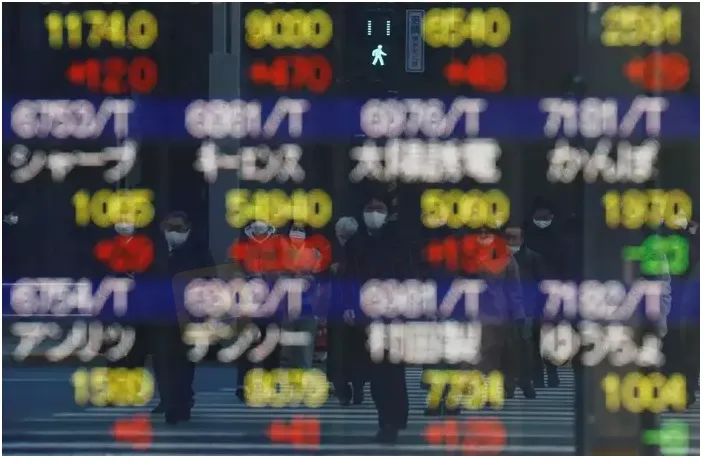简体中文
繁體中文
English
Pусский
日本語
ภาษาไทย
Tiếng Việt
Bahasa Indonesia
Español
हिन्दी
Filippiiniläinen
Français
Deutsch
Português
Türkçe
한국어
العربية
Asian stocks buoyed by Wall Street gains as easing oil cools inflation fears
Abstract:Stocks gained in Asia on Monday amid improved risk sentiment after Wall Street rebounded strongly at the end of last week as oil prices eased, tempering fears of prolonged inflation and the accompanying aggressive Federal Reserve tightening.

Treasury yields remained subdued and the dollar hovered near the lowest in more than a week as investors continued to assess the outlook for U.S. rate hikes, and the potential for a recession.
Japan‘s Nikkei rallied 1.04%, while Australia’s benchmark jumped 1.69%.
Chinese blue chips rose 0.54% and Hong Kongs Hang Seng advanced 1.46%.
South Koreas Kospi gained 1.65%.
MSCIs broadest index of Asia-Pacific shares rose 1.31%.
However, U.S. stock futures point to a 0.25% decline when those markets reopen. On Friday, the S&P 500 surged more than 3%, adding to an almost 1% gain on Thursday.
“We‘ve had a decent end to the week in the U.S. markets and I think that’s going to be the main scene for Monday here in Asia,” amid a dearth of news or other new drivers, said Rob Carnell, chief economist for Asia-Pacific at ING.
“We‘ve had two decent equity days on the run now. It’s perhaps notable that youve had some consistency there.”
Crude oil fell in volatile trading on Monday as the market grapples with concerns that a global economic slowdown could depress demand versus worries about lost Russian supply amid sanctions over the Ukraine conflict.
Both Brent and U.S. West Texas Intermediate (WTI) futures fell more than a dollar earlier. But, prices have rebounded with Brent at $112.78 a barrel, down 34 cents, and WTI at $107.17, down 45 cents. [O/R]
U.S. long-term Treasury yields hovered around 3.13% after bouncing off a two-week low just above 3% at the end of last week as traders removed bets for hikes next year, but still pondered if aggressive tightening this year could trigger a recession.
Yields have dropped from 3.456%, the highest in more than a decade, reached before the mid-month Fed meeting. Then, the central bank hiked rates by 75 basis points, the biggest increase since 1994, and signalled that a similar move is possible in July.
“The market remains focused in the trade-off between the policy response to high inflation and fears of a hard landing,” Westpac rates strategist Damien McColough wrote in a client note.
“There will be ongoing discussions as to whether long-end yields have peaked, however we would not yet expect 10-year yields to fall materially or sustainably below 3%.”
The dollar was steady on Monday, continuing to consolidate near the lowest since the middle of the month against major peers.
The dollar index – which measures the currency versus six rivals – was little changed at 104.01, after gradually gravitating over the past few sessions toward the June 17 low of 103.83.

Disclaimer:
The views in this article only represent the author's personal views, and do not constitute investment advice on this platform. This platform does not guarantee the accuracy, completeness and timeliness of the information in the article, and will not be liable for any loss caused by the use of or reliance on the information in the article.
Read more

Space World Capital - The Forex Broker You Should Not Partner with
Explore this guide to know the scam of Space World Capital, which does not hold a regulatory license to operate forex business.

Crypto Craze Fizzling Out? Here is Why
The Crypto Craze among users is fading out. The wave of Cryptocurrency has slowed down. But what are the major reasons why this has happened?

Social Trading Goes Mobile at M4Markets
A new mobile application for social trading has been launched through a collaboration between brokerage firm M4Markets and fintech provider Brokeree Solutions

ACY Securities Expands Crypto CFD Offering with 24/7 Trading Access
ACY Securities, a global broker specialising in CFD trading across multiple asset classes, has expanded its cryptocurrency offering by introducing 10 new digital currency CFDs and enabling 24/7 trading access across all its supported platforms
WikiFX Broker
Latest News
WikiFX Gala Night Malaysia Concludes Successfully
IG Group Unlocks Over £425 Million amid a Capital Reduction
Capital.com Strengthens UK FinTech Ties with Key Memberships
Stock futures fall after S&P 500 notches new record to cap winning second quarter: Live updates
CNBC Daily Open: Keep calm and carry on, investors
10-year Treasury yield ticks higher as investors eye jobs report
Elon Musk's xAI raises $10 billion in debt and equity as it steps up challenge to OpenAI
Crypto Craze Fizzling Out? Here is Why
Public companies bought more bitcoin than ETFs did for the third quarter in a row
Stock futures are flat after investors sell tech names to start the second half of 2025: Live updates
Currency Calculator


